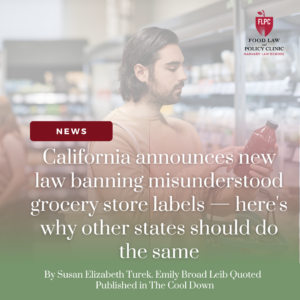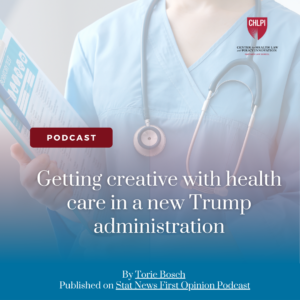Harvard University graduate Kelly Lee Morrow joined the Center for Health Law and Policy Innovation and the Harvard Food Law and Policy Clinic for the Third Annual Food is Medicine Symposium on October 29, 2015.
Read her blog post about the symposium, originally posted at Kelly’s Bright Light on Monday, November 2, 2015.
Thursday, October 29, I attended the Food Is Medicine event hosted by The Center for Health Law and Policy Innovation of Harvard Law School, the Harvard Food Law and Policy Clinic, and Community Servings. They had guests from three different areas of the health and food industry speak about innovations pertaining to Food Is Medicine. The three areas were The Role of Retailers in the Food Is Medicine movement, How the Healthcare System is Integrating Nutrition Programs to Improve Population Health, and Make the Case for Food Is Medicine with Data and Cutting Edge Research.
What struck me is that each presenter spoke about their area in the movement with great enthusiasm. It was apparent to see their excitement about being able to truly help, heal and serve people with the power of wholesome food. Though they had a shared passion, it was equally interesting to see how these people were making change for the same big picture movement, but coming at the issue from different angles. Annika Nielsen spoke about a pilot store in a low income area outside of Boston called Daily Table. Using donated foods, fresh produce and prepared meals they have been able to provide extremely low cost, healthy meals to low income and food stamp using citizens. Low income families are generally unable to afford healthy food, if any food at all. Having this option allows them to use food to prevent illnesses that run rampant in individuals who live at this socioeconomic status. Nielsen spoke of individuals coming in, tears in their eyes, so grateful to be able to afford this healthy food.
David Waters of Community Servings is coming from a post-diagnosis perspective. After individuals are diagnosed with an illness (the company was started exclusively serving those with HIV and has now expanded) wholesome meals are delivered to them, made specifically to target their health needs. These food health programs are being shown to not only be incredibly effective, but also much more cost effective than hospital visits and medication. Waters said with the cost of one hospital visit an individual can be fed for months instead.
Jody Adams, Chef and member of Board of Directors for Partners in Health, spoke about her experience, and her story effected me the most. She was involved in not only raising money to build hospitals in Haiti, but she went down and first hand taught the Hospital chefs how to cook wholesome foods for the patients. They said patients would come in sick, and after eating their food would get better and not want to leave. Adams said patients in these hospitals are eating better than patients in hospitals in the Boston area (not that there is a high standard, hospital food here is appalling). More than just being a hospital, they have programs there to help people with their homes, food, education and have found that helping people in these areas has helped to improve health across the board.
These are just three of the speakers that presented to a very full room of eager participants. Overall I very pleased that the concept of Food being Medicine is catching on. That Hippocrates, the father of modern medicine’s, prescription is being put into action in the modern world. I walked out of the door with a feeling that this is just the front of the wave, and I can’t wait to see where it goes.



Health Law & Policy, Commentary
Addressing The HIPAA Blind Spot For Crisis Pregnancy Centers
November 18, 2024